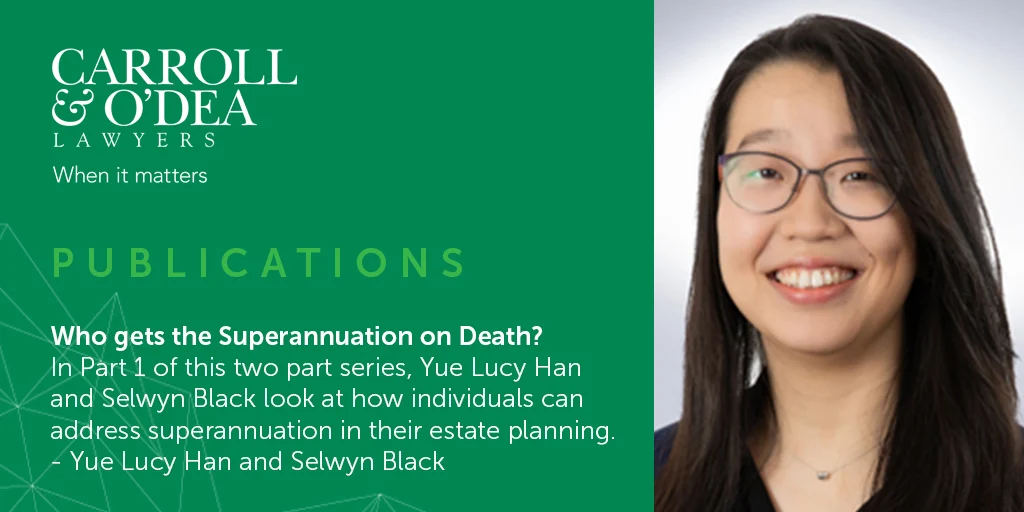
2021 Update: Who gets the Superannuation on Death? – Part 1
Published on March 9, 2021 by Selwyn Black and Yue Lucy Han
Part 1 of this two part series, Yue Lucy Han and Selwyn Black look at how individuals can address superannuation in their estate planning.
Introduction
A considerable proportion of our wealth now sits in superannuation. It is estimated that at the age of retirement (age 60-64) the average Australian will have over $200,000 in their super fund.[1]
Therefore, the question of who gets the superannuation on death (a.k.a ‘death benefits’) is an important topic to consider for two main reasons:
- For an individual to make sure their loved ones are cared for (a.k.a estate planning); and
- For loved ones to make, defend and resolve claims regarding allocation of superannuation.
Super fund Account Owner
An individual can best manage the future distribution of their super fund balance (and potentially reduce future disputes) through nominating beneficiaries via particular super funds.
The nomination process can vary between super funds, some may have binding nominations and/or non-binding nominations. For valid binding nominations, the distributions will generally be set. For a valid non-binding nomination, whilst it will generally have value, the super fund may still have discretion due to specific trust deed terms. Therefore, the manner in which the super fund exercises its discretion may cause disappointments.
Overall, individuals planning their estate should look at if and how nominations are to be dealt with under the Fund Deed, and if nominations are allowed ensure their nominations are appropriate, duly executed and regularly updated, to ensure they remain current and effective.
Individuals planning their estates should also nominate where they wish the death benefits to go, through a valid will. This is important as it is not unusual for super funds to pay to the benefits to executor or administrator under the last will. Also a super fund may take into account the preferences expressed in a will.
Super fund
A super fund trustee may have considerable discretion in dealing with the death benefits in the absence of a binding nomination. This varies considerably based on the particular method in its trust deed, for example:
- Some trust deeds require that the super fund must pay the death benefit first to a Legal Personal Representative (LPR), and only absent an LPR can the death benefit be paid to dependants or any other person; and
- Others grant the super fund wide discretion to allocate the death benefit between an LPR and the dependants or any other person.
This process is variable and may cause disappointments or disputes amongst the surviving members.
We can help
We welcome enquiries if you want to plan your estate to minimise a dispute, of if you would like advice on the procedure and prospects to make or defend a claim regarding superannuation.
As with any other areas, there are specific rules and procedures applicable to different circumstances. . Link to contact page
DECODING THE TERMS
Legal Personal Representative (LPR), which can include, according to the context,:[2]
(a) executor of a will;
(b) administrator of the deceased estate;
(c) trustee of the estate of a person under a legal disability; and
(d) a person who holds an enduring power of attorney granted by a person;
Dependants, commonly includes (at the time of death):[3]
(a) deceased’s spouse;
(b) deceased’s child;
(c) individuals with an interdependency relationship with the deceased;
Find out more:
Click here for Part 2 resolving disputes, to look at how individuals may resolve issues on the allocation of superannuation.
[1] Ross Clare, Director of Research, ‘Superannuation account balances by age and gender’, ASFA Research and Resource Centre, October 2017
[2] Superannuation Industry (Supervision) Act 1993 (Cth) s10.
[3] Commonly defined with reference to Superannuation Industry (Supervision) Act 1993 (Cth)

